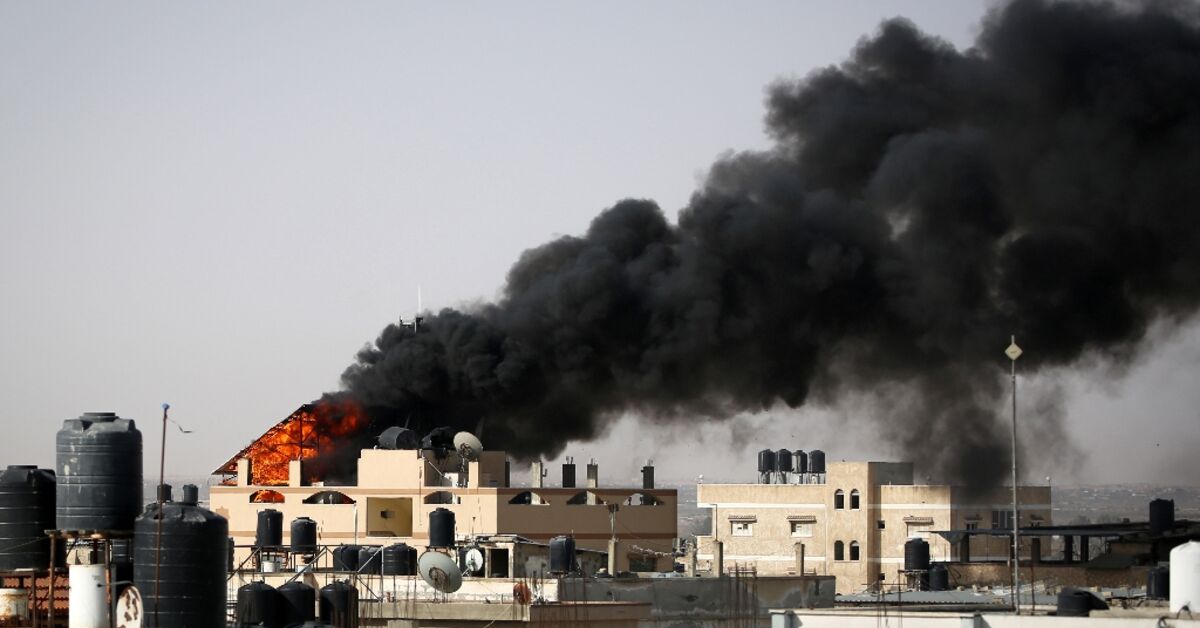Israeli strikes hit Gaza on Saturday after renewed US criticism over its conduct of the war and a UN warning of “epic” disaster if an outright invasion of crowded Rafah city occurs.
AFP journalists reported the strikes in various sectors of the coastal territory, where the UN says aid is blocked after Israeli troops defied international opposition and entered eastern Rafah this week, effectively shutting two crossings.
A long-awaited US State Department report on Friday said Israel likely violated norms on international law in its use of weapons from the United States — its main military supplier — but it did not find enough evidence to block shipments.
The State Department submitted its report two days after President Joe Biden publicly threatened to withhold certain bombs and artillery shells if Israel goes ahead with an all-out assault on Rafah, where the United Nations said 1.4 million had been sheltering.
After rising criticism from Washington over the civilian impact of Israel’s war against Hamas Palestinian militants, the threat was the first time Biden raised the ultimate US leverage over Israel — its military aid which totals $3 billion annually.
UN Secretary-General Antonio Guterres said Friday that Gaza risked an “epic humanitarian disaster” if Israel launched a full-scale ground operation in Rafah.
Israeli troops on Tuesday seized and closed the Palestinian side of the Rafah crossing between Egypt and Gaza — through which all fuel passes into the territory — after ordering residents of eastern Rafah to evacuate.
– ‘Heavily militarised’ –
Israel said its southern crossing with the Palestinian territory — Kerem Shalom — was reopened on Wednesday.
But a UN report late Friday said both crossings remain “heavily militarised” and cited Martin Griffiths, the UN’s aid chief, as saying closure of the crossings “means no aid”.
The war began with Hamas’s unprecedented October 7 attack on Israel, which resulted in the deaths of more than 1,170 people, mostly civilians, according to an AFP tally of Israeli official figures.
Israel’s retaliatory offensive has killed at least 34,943 people in Gaza, mostly women and children, according to the Hamas-run territory’s health ministry.
Israel’s military said it went into eastern Rafah to pursue militants. Fighting continued on the Gazan side of the Rafah crossing, the military reported on Friday.
Israeli Prime Minister Benjamin Netanyahu has repeatedly said Israel cannot defeat Hamas and eliminate any possibility of the militant group repeating its October 7 attack without sending ground troops into Rafah in search of remaining Hamas fighters.
The State Department report said it was “reasonable to assess” that Israel has used American weapons in ways inconsistent with standards on humanitarian rights but that the United States could not reach “conclusive findings”.
The report does not affect Biden’s threat to withhold certain bombs and artillery shells. The White House on Friday said it did not yet see a major operation in Rafah.
“We’re obviously watching it with concern, of course, but I wouldn’t go so far as to say what we’ve seen here in the last 24 hours connotes or indicates a broad, large (or) major ground operation,” said National Security Council spokesman John Kirby.
Biden’s administration had already paused delivery of 3,500 bombs as Israel appeared ready to attack Rafah.
– Displaced again –
Israel’s military operations around Rafah have already had a severe impact on Gaza civilians, UN agencies said.
More than 100,000 people have fled Rafah since Israel’s military on Monday issued an evacuation order affecting the city’s east, the United Nations said.
Many have returned to the city of Khan Yunis, where intense fighting raged earlier this year, or are crowded into shelters along the coast in the central town of Deir al-Balah.
Displaced civilian Malek al-Zaza said he had found “no food” and “no water” in central Gaza’s Nuseirat refugee camp.
“No one is asking about us, no one is looking for us… We only have God looking out for us,” he said.
The Rafah crossing is the only one normally used for deliveries of fuel, and the United Nations said the resulting exhaustion of stocks inside Gaza had effectively halted aid agency operations.
Israel said it had delivered 200,000 litres of fuel to Gaza on Friday through Kerem Shalom — the amount the United Nations says is needed every day to keep aid trucks moving and hospital generators working.
The Israeli army said four soldiers were killed on Friday when an “explosive device” went off near a school in Gaza City, in the territory’s north.
The deaths took to 271 the number of Israeli troops killed in the Gaza campaign since the start of its ground offensive on October 27.
The army said rocket fire from Gaza wounded an Israeli civilian in the southern city of Beersheba. It was the first time since December that the city had come under Palestinian rocket attack.
– Back to ‘square one’ –
Israeli and Hamas negotiating teams left Cairo on Thursday after what Egypt called a “two-day round” of indirect negotiations on the terms of a Gaza truce.
Hamas said Israel’s rejection of a truce plan submitted by mediators at the talks had sent the negotiations back to “square one”.
In New York, the UN General Assembly voted overwhelmingly Friday to grant the Palestinians additional rights in the global body and backed their drive for full membership, which is blocked by the United States.
Palestinian ambassador to the UN Riyad Mansour said the vote was historic, while Israeli Foreign Minister Israel Katz said it sent the message to Hamas that “violence pays off”.
Richard Gowan, an analyst with Brussels-based think tank the International Crisis Group, said the resolution sent “a very clear signal to Israel and the US that it is time to take Palestinian statehood seriously”.
burs-mca-it/dv
